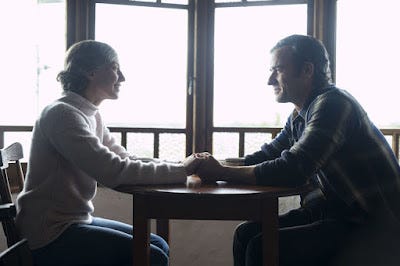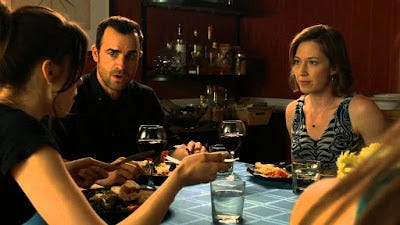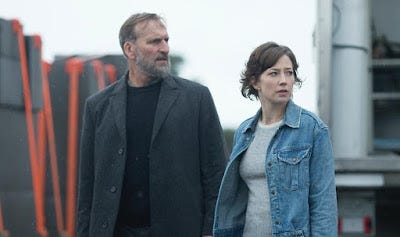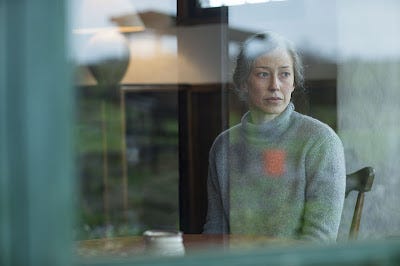“The Leftovers” Series Finale Review – Living in the Liminal Space of Loss

The following is a review of both The Leftovers series finale, “The Book of Nora,” and the series as a whole, also including personal reflections and meditations. It contains spoilers, for those so averse. Thanks in advance for reading. The piece begins after the jump…
There is a selfish quality about watching a loved one die. You want to empathize with them, to feel their pain and take on some part of it for yourself to unburden them, but the truth is you can’t. Everybody who has ever breathed air on this planet will eventually pass on, and so will all those yet to exist. Death is universal – and yet, the experience of it can only be shared by those who have already gone on; the fear of facing that unknown can only truly be felt and understood by ones who have stared death’s imminence in the face. When I took my Dad to the oncologist, or helped raise him from the floor after a tumor in his brain made his legs go out, or watched him rasp his last breaths in the room he and my mother shared for 13 years, I wanted to feel what he felt, to take on some part of the horrible burden that had been laid upon him. When he finally passed, and the coroner was taking his pale body from our house, a part of me wanted to follow, to go where he had gone, to see what he was seeing, to be with him wherever waited us all on the other side.
But death cannot be understood; the fear of it cannot truly be taken on by loved ones, and while we breathe air we cannot know where they have gone. It is a universal experience that cannot be comprehended by the living. And so, when we watch a loved one die, our thoughts inevitably turn inward, to the reality we ourselves will soon be facing: What will my life be like without you? What is this world without you here? What is it like to breathe in a world where you do not draw air? One day I will follow you – but the path to that place is unknowable to me now, and as you draw your last, I live in fear of every step I must take from here on to the end.
Death is final. Grief is not. Grief lives with us every day past its inception. It can be managed, can be confronted, can ebb and flow like tides on a beach, but while we live it cannot be dispersed or mastered. And when we face the absence of another in our lives, we live in mortal terror of that grief. Inevitably we shall be in its clutches; as long as we live, we must breathe alongside it. Grief is a companion on that long unknowable path, one that pushes and guides us on the long days and weeks and months and years that take us further and further away from our loss, but never outside the reaches of the tide it has summoned. How we live, how we move along that path, with this absence in our midst, with this grief in our hearts, is perhaps the great mystery of what it means to live on this earth.
The third and final season premiere of The Leftovers begins, as the second year did, with an allegory. A pious woman hears a Preacher speak of a departure, a day when God will come and take all who are good with him up to the heavens. She plans for that day with excitement in her heart, and climbs onto the roof with her family to await God’s arrival. He doesn’t show. So the Preacher adjusts his forecast, and the woman waits again, and brings her family up to the roof once more. God remains silent. The cycle repeats, and as the weeks and months drag on, the woman gradually loses her friends, her family, and the small settlement around her, all eroded by the need to move on. But this woman, her Preacher, and the pious few remaining cannot let go. So she climbs again and again onto that roof, awaiting an end that will never come – at least not in this fashion, in this world, on this stop along her path.
That pious woman is all of us, at one point or another. Whatever one’s trauma, living in this world means living through the hard and the unexpected. There is no roof to climb on that will whisk us away to a better world, an easier world, where all our human fear and frailty will magically dissipate. But it’s hard not to believe. One day, this pain will leave me. One day, I will ‘get over’ you. One day I will ‘move on.’ One day my path will be illuminated, and I will walk towards its destination with confidence, and I will be happy and whole all along the way. These are platitudes we want to accept, because the alternative – a lifetime spent in that liminal space where joy and grief and purpose and wandering are all intermingled, all parts of an unknowable multifold truth – is terrifying. The unknown of death is one thing. The unknown of living? In its own way, it can be just as scary.
For three seasons, The Leftovers has charted with incredible emotional precision the fathomless depths of these terrifying liminal spaces. Its central conceit – that on one random October 14th, two percent of the world’s population vanished without a trace – is high concept, but its storytelling is painfully real. Death and the ‘Sudden Departure’ aren’t all that different; either way, once those who have gone are no longer in our lives, we have to go on without them. The Departure serves less as a revelation about the nature of the world that is to come as it does a powerful reminder of how unknowable and mystifying our daily life on this earth truly is – how governed we are by emotions and sensations we cannot scarcely understand.

And so, for three years, Damon Lindelof and company have charted these liminal everyday waters, using a language that is sometimes familiar, oftentimes uncomfortable, and that, on many occasions, verges upon the shores of insanity. In short: A microcosm of human experience. The first season was a paean to the rawest of griefs, a series of stories about people so consumed with loss and emotional pain that it feels as though their minds, bodies, and the fabric of the world around them is bursting apart at the seams. Some characters hear voices; some shed all love and hope and descend into nihilism; some hold it all together on the outside so convincingly that they forget how broken they are internally; and others shake slowly apart day by day, falling to pieces before they can fully realize what is happening.
Those descriptions, of course, match Kevin Garvey Sr. (the great Scott Glenn, giving the best performance of a late career hot streak); alternatively Laurie Garvey (an amazing and perhaps underrated Amy Brenneman) or cult leader Patti Levin (an all-time, ferocious performance from Ann Dowd); eventual series co-lead and focus of the series finale Nora Durst (breakout star Carrie Coon, who should already have 2 Emmys for this show rather than 0 nominations); and central protagonist Kevin Garvey Jr. (Justin Theroux giving not only the best work of his career, but a leading man turn every bit on par with other 21st-century TV greats like James Gandolfini, Ian McShane, Jon Hamm, and Bryan Cranston).
One character that probably doesn’t get discussed much in run-downs like these is Kevin’s son Tommy, played by Chris Zylka; he’s the one lead the show never quite knew what to do with, perpetually existing on the periphery of stories without ever coming fully into the fold. In current and future dissections of the series, Tommy will rightly be a low priority for anyone wishing to discuss the greatness and wisdom The Leftovers had to offer. In the Pilot, however, Zylka’s Tommy is at the center of an image that is, at the outset at least, something akin to the show’s Thesis statement. He strips naked, dives underwater in a pool, and screams as loud as he can into the watery vacuum – all that bare pain going nowhere, unheard by the world, floating perpetually in an ether in no real direction.

The symbolic image is like a water-birth version of grief, and I would wager all who have ever felt loss or depression or any kind of emotional pain or suffering have felt it in similarly raw, naked fashion. But grief doesn’t stay in the water like that forever, of course, and neither did The Leftovers. The first season turned many a viewer away with its unflinching approach to expressing the internal realities of grief, but like a person moving through this world after a loss is manifested, the show itself began to evolve.
The second season is an afterimage, a variation on the same themes played out in a new location, with most central characters returning but this time joined by a number of new players. It asked whether there is such a thing as truly ‘moving on’ from grief, if there is a place in the world where people can be truly emotionally unburdened, its central conceit this time being a town in which all inhabitants were spared from the Sudden Departure. Formally, the show became bolder and more daring, its visual style bolstered by lead director Mimi Leder’s quietly beautiful take on the material, its storytelling willing to go out on the kind of experimental limbs American television has really only seen when David Lynch was spinning yarns about darn good coffee.
Emotionally, however, I would argue the show never overhauled itself – it simply put one foot in front of the other and continued the journey, now telling a story about how powerfully grief can work on people when it is ignored. Violence, mania, and even trips to another dimension became core melodies in what was ultimately a story of forgiveness, of the emotional release that comes from absolving oneself and one’s neighbors and allowing one’s emotions to flow freely. The closing stretch of the Season 2 finale, in which would-be enemies Kevin Garvey and John Murphy (a stupendous and probably underused Kevin Carroll) accompany each other home through a ruined Jarden is symphonically cathartic. After John shoots Kevin point-blank only for Kevin to survive (it’s a long story), John breaks down crying, confessing he simply does not understand “what is going on” – in the world, in his town, in his life, in his heart. Kevin understands. He forgives. And when they get home and part ways, John confesses he’s scared. He asks what he should do if he returns home to find his family has left him.
“Then you come over to my house,” Kevin says matter-of-factly. And I break down crying every time.
The Leftovers is, for all the darkness inherent in its subject matter, a fundamentally optimistic show. It believes in the resilience of the human spirit and in the notion that emotional gauntlets, far from breaking people, can have the capacity to create stronger, better individuals. It knows that families and communities can be torn apart, but also believes humans are capable of finding and creating new homes and relationships. Damon Lindelof’s last show, Lost, posited that ‘everything happens for a reason.’ The Leftovers isn’t so naïve as to take that platitude at face value, but it shares a related, if more complex, philosophy: That meaning can be made out of even the most senseless tragedies, and that this is why mankind endures.

This year’s third and final season only continued the show’s rise as one of modern televisions most formally, narratively, and artistically accomplished shows, a run of eight more or less perfect episodes that went deeper, weirder, and more extreme than ever before. For a time, however, I wondered if the show was also evolving its sense of what I previously thought of as ‘optimism.’ This third year, while not as ‘dark’ as the first, depicts characters backsliding and falling apart, revealing the emotional climaxes and personal revelations at the heart of the second season were, like all things in this world, impermanent. Kevin regains a normal life but continually wraps his head in a plastic bag to simulate the near-death experiences he felt three years earlier; Nora is still the most capable person in town on the outside, but is so frayed with grief internally that she chases an insane science project halfway around the world; Laurie finds a new life for herself, but contemplates suicide after seemingly running out of things to live for; Matt Jameson’s faith drives away the only things he ever lived for in his wife and child; Kevin Sr. wanders the Australian outback, risking his life in a manic search for an ancient song that will stop a supposed great flood.
In some places, the optimism I previously wrote about seemed to be in short supply; by the end of tonight’s finale, however, it was clear that this philosophy, like every aspect of the show, was merely continuing to evolve. No resolution in this third season is perhaps as hopeful as those afforded to some characters in the second, but all belong to that core ethos of making meaning out of tragedy. The zaniest example of this is Kevin, having drowned himself to revisit the other world, cutting the heart out of his twin doppelganger in order to nuke the entire world and destroy his instinct to escape instead of confront his darkest emotions (once again, it’s a long story). The thematically purest example might instead be Matt’s story in the fifth episode, as the Reverend (played in another of the show’s absolutely towering performances by Christopher Eccleston, a man who was once Doctor Who but here does even greater work) has a chance to symbolically come face-to-face with God, like Job himself, and comes away with the most manic aspects of his faith eroded. He’s terminally ill and has relationships to repair, but he also, for the first time in the life of the series, feels free, his odd and increasingly insane journeys having brought himself to a place of something resembling peace.
It’s Matt, in fact, who arguably provides the most thematically important lines of dialogue in tonight’s outstanding finale, “The Book of Nora.” The episode belongs to Carrie Coon, of course, and it’s she who delivers the denouement of the entire series, a riveting 10-minute monologue about a journey she may or may not have taken, and the absolution she seeks in asking the man sitting across the table to believe in her. Matt’s scene comes much earlier, both in the real-world time of the episode and especially in the diegetic chronology of the story, in his final conversation with sister Nora. It’s another one of those Leftovers scenes that absolutely flattened me, largely due to Coon’s and Eccleston’s performances, and to all the unspoken things resting between them as they say their final goodbyes.
At one point, though, Matt speaks about his own impending death from leukemia – and how there are so many things he’s scared of confronting back home, from his family to the doctors to the thought of his son growing up without a father. And then he confesses what is, I think, the evolved, dialogue-driven version of that visual, underwater thesis I mentioned earlier:
“But most of all I’m scared that I’ll survive. Because if I do, how can I ever stand in front of a room full of people and convince them that I have the answers when I have no idea what the fuck I’m talking about?”
Though specific to Matt’s life and experience, that sentence is grief of all shapes personified – the terror of continuing to draw breath in a world that has ceased making sense.

This is, to me, the question at the heart of the show, summarized in one beautiful exchange. I have said before that The Leftovers has its finger on the emotional pulse of our times better than any other filmed media out there today. The show is not political, nor does it ever reference current events, but that core question, the notion that it can be agonizingly difficult to live when the world stops making sense, is something it feels like the whole world is collectively feeling at once today. On some level, of course, it’s always been this way; but it’s impossible not to think about mass violence and terror attacks around the world, or shifts in the fortunes of marginalized groups around the planet, or the collective trauma of the US election and its aftermath in analyzing the broken world of The Leftovers. Lindelof has said the Sandy Hook Elementary shooting was an early emotional signpost for the series, something he and Pilot director Peter Berg considered when shaping the emotional atmosphere of the show. In the years since, there have been plenty of other communal traumas one could apply to the emotional tenor of The Leftovers. The show is not an allegory for any one real-world event, but no matter what kind of grief or pain or emotional confusion one is dealing with, there is probably at least one small element of The Leftovers that is powerfully analogous. Grief and trauma and loss create daunting liminal spaces for us all, and the act of living in those spaces is where one finds the substance of human experience.
The brilliance of tonight’s finale, though it took me some time to fully realize it, lies in how beautifully it portrays this daily struggle at the heart of the series. The finale is not apocalyptic. There is no great flood, no second departure, no singular event that serves as a ‘traditional’ climax. It contains no on-screen character deaths, no scenes of heightened tension, and not even any trips to another world like those Kevin experienced on three separate occasions. It is, in essence, a short story about one woman trying to live her life, one man who knows he cannot go on without her, and the emotional revelations they both unearth when they re-enter one another’s orbit.
It is fitting the finale center on Nora in this way; Kevin got at least a piece of his emotional resolution in last week’s insane crackerjack of an episode, and though Nora may have started the series as a relatively minor character, her tragic losses on October 14th and her evolving centrality in the narrative make her a fitting thematic lynchpin for this final chapter. The episode arrives at something of a happy ending, but like all the stories in this third season, it is far from a clean resolution. Nora has spent years in solitude, her tendency to bottle up her emotions having reached such a boiling point that the only way she can go on living is to shut herself off from the outside world, seeking nothing and feeling little. Those lost years, for both her and for Kevin, can never be reclaimed, though like anything painful in the world of The Leftovers, they can at least be rendered meaningful.
The re-emergence of Kevin into her life leads Nora to feel things again – and so much of the beauty of tonight’s episode comes from how Coon, Theroux, and director Mimi Leder play these small, quiet exchanges. I am sure reams will be written about the dance scene at the wedding, where both Nora and Kevin are overcome with emotion as they embrace each other once again, Leder’s camera swaying closely alongside them, and deservedly so. It is a stupendous sequence.
The one that really got me, however, is perhaps the most quintessentially Leftovers moment of the episode, as Nora, fleeing from the wedding, happens upon the Goat used in an earlier ceremony. Everybody at the wedding placed beads symbolizing sin around the Goat’s neck and then sent it out into the wild, something that strikes me (and evidently Lindelof and company) as more cruel than symbolic. Nora crashes her bike and finds the goat bleating mournfully, caught on a barbed wire fence by the beads – and because she is a witness, because it seems like the right thing to do, because it is the only action in this crazy series of moments that appears to have immediate impact and meaning, Nora goes to free the goat. It is a Sisyphean task, the Goat high on a hill slick with mud and rain, and Nora falls before she can arrive at the goat. In a mesmerizingly realized sequence that combines the show’s penchant for religious imagery and the tragic ethereality of Max Richter’s haunting score, Nora not only saves the goat, but takes all the sin beads onto her own neck – and in the moment, for both Nora and the viewer, it feels like the most cathartic, meaningful, cleansing experience possible. That she gets a cool pet goat out of the ordeal provides some last minute humor and deepens the show’s themes of makeshift families all at once.

Finally, Kevin arrives, and the final sequence of The Leftovers begins. He tells his story, about how he has come to Australia two weeks every year to search for Nora, because this unresolved love was something he could never let go. And Nora, in turn, tells hers, a stunning monologue that is so many things at once: An emotional confession from one lover to another; a grand sci-fi story that potentially provides all the answers about the departure this show was, to its great credit, never interested in; an allegory about the universal emptiness of loss, and the journeys it takes us on, and the way it makes ‘ghosts’ of us all.
Already, I have seen some analyses of this episode expending too much effort on the question of whether or not Nora’s story is true. As with many of the finest stories, the ambiguity is itself the point: That whether or not Nora literally experienced these things, the fact that she speaks the words to Kevin is meaningful. That the conclusions she draws in her narrative, whether literal or allegorical, arrive at a fundamental truth Nora has realized about herself and her world after all these years of searching. That only Nora herself can ever really know what happened to her in those long intervening years, and that interrogating the ‘reality’ of her story will not take anyone else, viewers included, very far at all.
And most importantly, that whether she visited another world or not, the conclusion she and Kevin draw is the same simple, powerful, wonderful, meaningful truth:
“I believe you,” he says in earnest.
“You do?” she asks with astonishment and joy.
“Why wouldn’t I believe you?” he responds, as though looking upon the face of God, the source of ultimate meaning. “You’re here.”
“I’m here,” she says softly. And she smiles, a smile so full and wonderful and life-affirming, a smile imbued with 28 hours of one of the great American television dramas ever produced.
We, too, are here – on this earth, together, drawing breath, living. And whether we want to admit it, that simple act of living can be a terrifying, difficult, agonizing thing to endure, especially in the lifelong aftershock of loss or trauma.
But presence is also a gift. To live is to endure tragedies; this we all must do. Those tragedies need not, however, become all we are, for we are and can be so much more. As long as we are here, we can continue searching for our own individual meanings, can be in the presence of those who search as we do, can take comfort together in knowing that those mysteries of life and love and death shape who we are and who we shall be. It’s not easy. The path is not a straight line, its destination is never clear, and emotional healing inevitably involves pain and relapse. But the journey is, in itself, meaningful. To draw breath is to find meaning – one day at a time, one step at a time, one inhale at a time.
Nora and Kevin will continue journeying, as shall all Leftovers viewers once the final credits roll. But they’re here, and we’re here, and as long as there is presence, there is hope. This is not the ending, for them or for us, but it is happy, and it is meaningful, and it is a good moment that shall give birth to a new path of experiences. Let the mysteries be, let the feelings flood in, and find catharsis in one’s liminal wanderings; there, all meaning lies.
Follow author Jonathan Lack on Twitter @JonathanLack.
Subscribe to The Weekly Stuff Podcast with Jonathan Lack and Sean Chapman on iTunes here.

